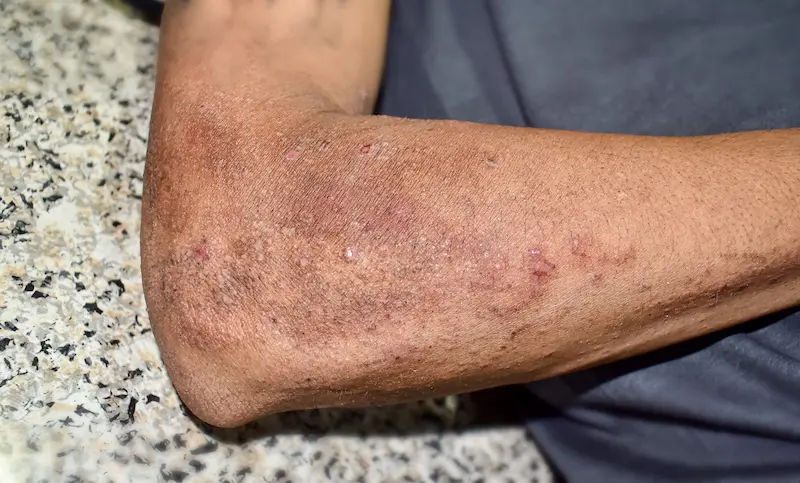Keratomalacia Overview: Symptoms, Causes, and Treatment
Learn about Keratomalacia, a severe eye condition. Discover its symptoms, the link to Vitamin A deficiency, and the crucial treatment options available to prevent blindness.

Written by Dr. Dhankecha Mayank Dineshbhai
Reviewed by Dr. M L Ezhilarasan MBBS
Last updated on 24th Aug, 2025
.webp?tr=q-80,f-webp,w-350,dpr-2,c-at_max 700w)
Introduction
Keratomalacia is a serious eye condition caused by a severe deficiency of vitamin A, leading to the softening and deterioration of the cornea (the clear front part of the eye). If left untreated, it can result in vision loss or even blindness. The good news is that this condition is preventable and treatable with proper nutrition and timely medical care.
In this article, we’ll discuss the symptoms, causes, and treatment options for keratomalacia, along with simple lifestyle changes to protect your eye health.
What is Keratomalacia?
Keratomalacia occurs when the cornea becomes extremely dry and starts to break down due to a lack of vitamin A. Vitamin A is essential for maintaining healthy vision, skin, and immune function. Without enough of it, the eyes cannot produce enough moisture, leading to severe dryness, ulcers, and, eventually, corneal damage.
This condition is more common in:
- Children, especially in developing countries where malnutrition is widespread.
- Adults with digestive disorders that prevent proper absorption of nutrients.
- People with extremely poor diets lacking in vitamin A rich foods.
Symptoms of Keratomalacia
Early detection is crucial to prevent permanent vision loss. Look out for these signs:
Early Symptoms
- Night blindness (difficulty seeing in low light)
- Extreme dryness in the eyes (xerophthalmia)
- Redness and irritation
- Sensitivity to light (photophobia)
Advanced Symptoms
- Cloudy or hazy cornea (appears dull or opaque)
- Corneal ulcers (open sores on the eye)
- Softening and melting of the cornea (keratomalacia)
- Severe pain and vision loss
If you or someone you know experiences these symptoms, seek medical help immediately.
What Causes Keratomalacia?
The primary cause is a severe vitamin A deficiency, which can happen due to:
1. Poor Diet
- Not eating enough foods rich in vitamin A (like carrots, sweet potatoes, spinach, eggs, and dairy).
- Long-term malnutrition, especially in children.
2. Digestive Disorders
- Conditions like celiac disease, Crohn’s disease, or chronic diarrhea can prevent the body from absorbing vitamin A properly.
3. Liver Diseases
- The liver stores vitamin A, so liver damage can lead to deficiency.
4. Alcoholism
- Excessive alcohol consumption interferes with vitamin A absorption and storage.
Consult a General Physician For The Best Advice
How is Keratomalacia Diagnosed?
An eye specialist (ophthalmologist) can diagnose keratomalacia through:
- Eye examination (checking for dryness, ulcers, or corneal damage).
- Blood tests (to measure vitamin A levels).
- Medical history review (to identify dietary or digestive issues).
If you suspect a vitamin A deficiency, book an eye checkup through Apollo24|7 for quick and professional diagnosis.
Treatment Options for Keratomalacia
The treatment focuses on restoring vitamin A levels and preventing further eye damage.
1. Vitamin A Supplements
- Highdose vitamin A supplements (oral or injectable) are given under medical supervision.
- Children may receive vitamin A capsules as part of immunization programs in highrisk areas.
2. Eye Drops and Ointments
- Artificial tears to keep the eyes moist.
- Antibiotic ointments if an infection is present.
3. Dietary Changes
- Increase intake of vitamin Arich foods:
- Animal sources: Liver, eggs, milk, cheese.
- Plant sources: Carrots, sweet potatoes, spinach, mangoes, papayas.
4. Treating Underlying Conditions
- If malabsorption (due to digestive disorders) is the cause, treating the root condition is necessary.
5. Surgery (In Severe Cases)
- If the cornea is severely damaged, a corneal transplant may be needed to restore vision.
Prevention Tips
Keratomalacia is largely preventable with simple measures:
1. Eat a Balanced Diet
- Include orange and green vegetables, dairy, and eggs in your meals.
- Breastfeeding infants helps provide essential vitamin A.
2. Take Supplements if Needed
- Pregnant women, young children, and people with digestive issues may need supplements (consult a doctor first).
3. Regular Eye Checkups
- If you have night blindness or dry eyes, get tested early.
4. Protect Your Eyes
- Wear sunglasses to reduce light sensitivity.
- Avoid rubbing your eyes if they feel dry.
When to See a Doctor?
Seek immediate medical attention if you notice:
- Persistent night blindness.
- Extreme dryness, redness, or pain in the eyes.
- Cloudy vision or corneal changes.
Early treatment can save your vision! Book an appointment with an eye specialist on Apollo24|7 for expert care.
Final Thoughts
Keratomalacia is a serious but preventable condition. By ensuring a vitamin A rich diet and seeking timely medical help, you can protect your eyesight. If you or a loved one shows symptoms, don’t delay—consult a doctor today.
Stay healthy, stay informed!
Consult a General Physician
Consult a General Physician

Dr. Sandhya Chandel
General Physician/ Internal Medicine Specialist
16 Years • MBBS, MD (Int. Med.), IDCCM
Bilaspur
Apollo Hospitals Seepat Road, Bilaspur
(125+ Patients)

Dr. Mohamed Azeem
General Physician/ Internal Medicine Specialist
2 Years • MBBS,MD(Internal Medicine) CCEBDM
Karaikudi
Apollo Hospitals Karaikudi, Karaikudi

Dr. Harshendra Jaiswal
General Physician/ Internal Medicine Specialist
12 Years • MBBS , MD (General medicine)
Kolkata
108 DHANA DHANVANTARI Clinic, Kolkata
(25+ Patients)

Dr. Ashita Kuruvilla
General Practitioner
6 Years • MBBS
Kolkata
KVC CLINIC, Kolkata

Divyashree K
General Physician/ Internal Medicine Specialist
5 Years • MBBS
Bengaluru
Apollo Clinic, JP nagar, Bengaluru
Consult a General Physician For The Best Advice

Dr. Sandhya Chandel
General Physician/ Internal Medicine Specialist
16 Years • MBBS, MD (Int. Med.), IDCCM
Bilaspur
Apollo Hospitals Seepat Road, Bilaspur
(125+ Patients)

Dr. Mohamed Azeem
General Physician/ Internal Medicine Specialist
2 Years • MBBS,MD(Internal Medicine) CCEBDM
Karaikudi
Apollo Hospitals Karaikudi, Karaikudi

Dr. Harshendra Jaiswal
General Physician/ Internal Medicine Specialist
12 Years • MBBS , MD (General medicine)
Kolkata
108 DHANA DHANVANTARI Clinic, Kolkata
(25+ Patients)

Dr. Ashita Kuruvilla
General Practitioner
6 Years • MBBS
Kolkata
KVC CLINIC, Kolkata

Divyashree K
General Physician/ Internal Medicine Specialist
5 Years • MBBS
Bengaluru
Apollo Clinic, JP nagar, Bengaluru
